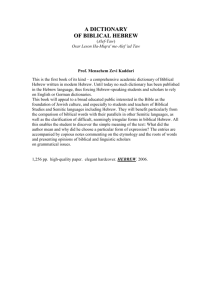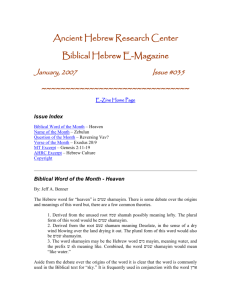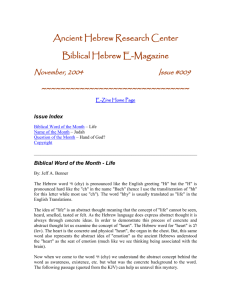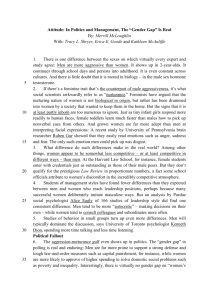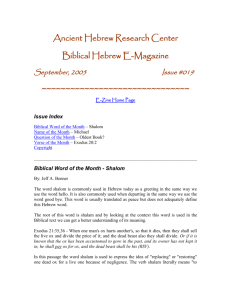Biblical Hebrew E-Magazine - Ancient Hebrew Research Center
advertisement
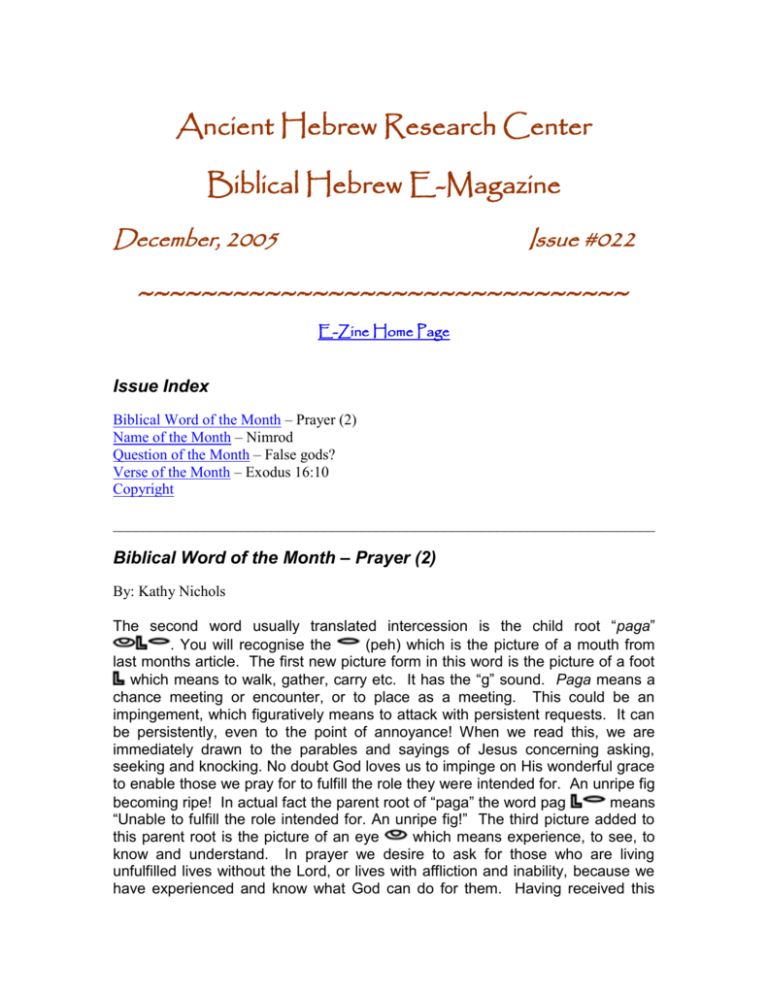
Ancient Hebrew Research Center Biblical Hebrew E-Magazine December, 2005 Issue #022 ~~~~~~~~~~~~~~~~~~~~~~~~~~~~~~~ E-Zine Home Page Issue Index Biblical Word of the Month – Prayer (2) Name of the Month – Nimrod Question of the Month – False gods? Verse of the Month – Exodus 16:10 Copyright ________________________________________________________________________ Biblical Word of the Month – Prayer (2) By: Kathy Nichols The second word usually translated intercession is the child root “paga” . You will recognise the (peh) which is the picture of a mouth from last months article. The first new picture form in this word is the picture of a foot which means to walk, gather, carry etc. It has the “g” sound. Paga means a chance meeting or encounter, or to place as a meeting. This could be an impingement, which figuratively means to attack with persistent requests. It can be persistently, even to the point of annoyance! When we read this, we are immediately drawn to the parables and sayings of Jesus concerning asking, seeking and knocking. No doubt God loves us to impinge on His wonderful grace to enable those we pray for to fulfill the role they were intended for. An unripe fig becoming ripe! In actual fact the parent root of “paga” the word pag means “Unable to fulfill the role intended for. An unripe fig!” The third picture added to this parent root is the picture of an eye which means experience, to see, to know and understand. In prayer we desire to ask for those who are living unfulfilled lives without the Lord, or lives with affliction and inability, because we have experienced and know what God can do for them. Having received this Biblical Hebrew E-Magazine experience from such a benevolent and kind creator should challenge us to walk as close to Him as we can. This will enable God to touch our hearts in prayer to experience at times how other people feel and also how He Himself feels. This is an immense honour. Is 53:12 “ while actually bearing the sin of many and interceding for the offenders.” Is 59:15b,16a “..Adonai saw it, and it displeased Him that there was no justice; He saw there was no one, and was amazed that that no one interceded. Therefore His own arm brought him salvation…” Here the words for intercession are “paga”. So what Isaiah is pointing out is that God desired to bring about justice, but there was no intercessor – no-one willing to impinge on Him and because of the terrible state of the land, and no-one praying, God was appalled and disappointed. A fascinating use of “paga” is found in Isaiah 53:6 ..the Lord laid (paga) on him the iniquity of us all.” The word is meaning our sins “fell” on Jesus, (so we could become what He intended). If one reads through all the verses using “paga” a good number of them are about “falling on” someone and the person dying, so there is great intensity in this word. Interestingly, the Latin word peccare “to sin”, is associated with the Hebrew word “pag” (unripe fig). Some believe that the tree of knowledge was the fig tree. Rashi (A well known Jewish sage) says it has to do with the fact that they used fig leaves to cover themselves: “..which they had eaten, and by the very thing by which they were corrupted they were rectified.” Other commentators deduce this because the fig tree was obviously nearest them when they discovered they were naked. Sources: o The New Strongs Concordance o The Ancient Hebrew Language and Alphabet – Jeff Benner o The Ancient Hebrew Lexicon – Jeff Benner o Food at the time of the Bible – Miriam Feinberg Vamosh o Complete Jewish Bible – Translated by David H. Stern copyright 1998. o www.blueletterbible.org o www.ancient-hebrew.org o www.mechon-mamre.org o www.jerusalemperspective.org Special thanks to my ongoing Hebrew teacher Fr John Durkan and also Jeff Benner for his awesome research and personal encouragement. 2 Biblical Hebrew E-Magazine ________________________________________________________________________ Name of the Month - Nimrod By: Jeff A. Benner The name nimrod is not Hebrew but it is a Semitic name and is therefore closely related to Hebrew. The name comes from the Semitic root ( מרדMRD) meaning "to rebel". In the Ancient Hebrew/Semitic cultures a person’s name was closely related to their character and therefore Nimrod's name fits well with his personality. The name is formed by placing the letter ( נN) before the root. A common means of forming words and names out of a root in Hebrew is by placing the letter ( מM) before the root while other Semitic languages use the letter ( נN). Because of this we know that Nimrod is of a non-Hebrew Semitic origin. The person Nimrod is only mentioned in Genesis 10:8,9 but these two passages speak volumes about the character of Nimrod. The standard translation for verse 9 is something like "He was a mighty hunter before the LORD; therefore it is said, "Like Nimrod a mighty hunter before the LORD". It would appear that there is nothing out of the ordinary about Nimrod. So, why is he so often seen as such an evil person? Only two persons in the Bible are identified as "hunters", Nimrod and Esav, the twin brother of Ya'acov. From the story of Esav and Ya'acov we know that Esav was not the most respectful person. Not only did he despise his birthright but to spite his parents married foreign women. From this we can conclude that from an Hebraic perspective hunters are seen in a negative light. In verse 8 it states "he was the first on earth to be a mighty man". The Hebrew phrase may also be translated as "He made a profaning by being a mighty one in the land". To add to this verse 9 states that he was a "mighty hunter 'before' Yahweh". The word for "before" in Hebrew is "liph'ney" and literally means "to the face of" and in this case "to the face of Yahweh" and can mean that he was a mighty hunter in place of Yahweh implying that he, rather than Yahweh is the provider of the people. One final clue into the character into the personality of Nimrod is how the Semitic root MRD has been used even into our own time. The Ancient Semitic root MRD (marad) is the origin of our words MaRauDer and MuRDer. _______________________________________________________________________ Question of the Month – False gods? By: Jeff A. Benner Q: Which Hebrew words are used for God and which for false gods? 3 Biblical Hebrew E-Magazine A: In reality, the modern western concept, or what we think of as God or a god is completely foreign to the Hebrew text of the Bible. There are three Hebrew words used for God. The word "el" means one of power and authority and used for God in Genesis 1:1. The word "elo'ah" means one of power and authority which yokes himself to another and is used for God in Job 3:4. The word "elohiym" is the plural form of elo'ah and is used for God in Genesis 14:18. These same Hebrew words are also used for false gods. In Genesis 31:30 the word elohiym is used for Laban's household gods. In Habakukk 1:11 the word el'oah is used for the god of the goyim (nations). In Isaiah 45:20 the word el is used for a god of the goyim. ________________________________________________________________________ Verse of the Month – Exodus 16:10 By: Jeff A. Benner ַוי ְִהי כְ דַ בֵּ ר ַאהֲ רֹן ֶאל־ ָּכל־ע ֲַדת בְ נֵּי־י ְִש ָּר ֵּאל ַויִפְ נּו ֶאל־הַ ִמ ְדבָּ ר וְ ִהנֵּה כְ ֹבוד יְהוָּ ה ִנ ְר ָּאה בֶ עָּ נָּן׃ And it came to pass, as Aaron spake unto the whole congregation of the children of Israel, that they looked toward the wilderness, and, behold, the glory of Jehovah appeared in the cloud. (ASV) ( ַוי ְִהיvay-hiy) The root is ( היהhayah) meaning to exist or be. When a root ending with the letter ( הh) is conjugated as a verb, the final ( הh) is dropped. The prefix ( וv) means "and". The prefix י (y) identifies the subject of the verb as masculine, singular, imperfect tense - he will exist. But because the verb is prefixed by the ( וv) the tense of the verb reverses to the perfect tense and becomes "and he existed" or "and he was". This phrase would be translated into English as "and it was" or "and it came to pass". ( כְ דַ בֵּ רke-da-beyr) The letter ( כk) is a prefix meaning "like". The base word ( דברDavar) is a verb meaning to speak. When a verb root is prefixed by a preposition, the verb is in the infinitive form meaning that the subject of the verb is not identified. The word would then mean "like speaking". ( ַאהֲ רֹןa-ha-ron) This is the name commonly transliterated as Aaron, the brother of Moshe (Moses). 4 Biblical Hebrew E-Magazine ( ֶאלel) This word is a preposition meaning "to" or "toward". ( כָּלkol) A very common Hebrew word meaning "all". ( עֲדַ תa-dat) The base word is ( עדהeydah) meaning an assembly, but in its original sense is the flock of the shepherd. This word is used in the possessive (assembly of...). A possessive word ending with the letter ( הh) is changed to a ( תt). ( בְ נֵּיbe-ney) The base word is ( בןben) meaning a son. In the plural form this word is written as בנים (beniym). Another grammatical rule when dealing with possessives is if the word in the possessive is written with the masculine plural suffix, ( יםiym), the ( םm) is dropped. ( י ְִש ָּר ֵּאלyis-ra-el) This is the name commonly transliterated as Israel. This name consists of two words, ישר (yasar) meaning "he turns" and ( אלel) meaning "God" or more literally a powerful one. Combined, this name means "he turns the powerful one". ( ַויִפְ נּוvay-yiph-nu) The base word is the verb ( פנהpanah) meaning to "turn". When a verb ends with the letter ( הh) it is dropped when the word is conjugated. The ( יy) in front of the base word and the ( וu) behind the base word identifies the subject of the verb as masculine plural imperfect tense (they turn or they will turn). The prefix ( וv) is the conjunction meaning "and" and also often reverses the tense, in this case from imperfect to perfect tense (they turned). ( ֶאלel) This word is a preposition meaning "to" or "toward". ( הַ ִמ ְדבָּ רha-mid-bar) The base word is ( מדברmidvar) meaning "wilderness". The prefix ( הh) is the definite article meaning "the". ( וְ ִהנֵּהve-hin-neyh) The base word is ( הנהhin-neyh) meaning "look here" and is often translated as "behold" and is prefixed by the conjunction ( וv) meaning "and". ( כְ ֹבודke-vod) This word is usually translated as "honor" or "glory" but literally means "heavy". When we give honor to another we are putting weight to that person. 5 Biblical Hebrew E-Magazine ( ְיהוָּהYHVH) Commonly called the Tetragramaton, the name of God. ( ִנ ְר ָּאהnir-ah) The base word is the verb ( ראהra'ah) meaning to "see". The prefix ( נn) identifies the verb as a Niphal (simple passive), third person masculine singular perfect tense - "he was seen" or "he appeared". ( בֶ עָּ נָּןbe-a-nan) The base word ( ענןanan) is a cloud. The prefix ( בb) means in. The following is a literal rendering of this verse from its Hebraic meaning. And it came to pass, like a speaking of Aharon to all the flock of the sons of Yisrael and they turned to the wilderness and look here, the heaviness of YHVH was seen in the cloud. ________________________________________________________________________ Copyright © 2005 Jeff A. Benner Ancient Hebrew Research Center Please feel free to use, copy or distribute any material within the "Biblical Hebrew E-Magazine" for nonprofit educational purposes only. ________________________________________________________________________ 6
